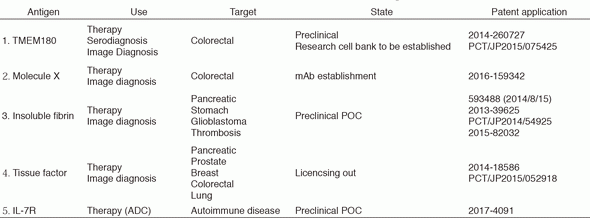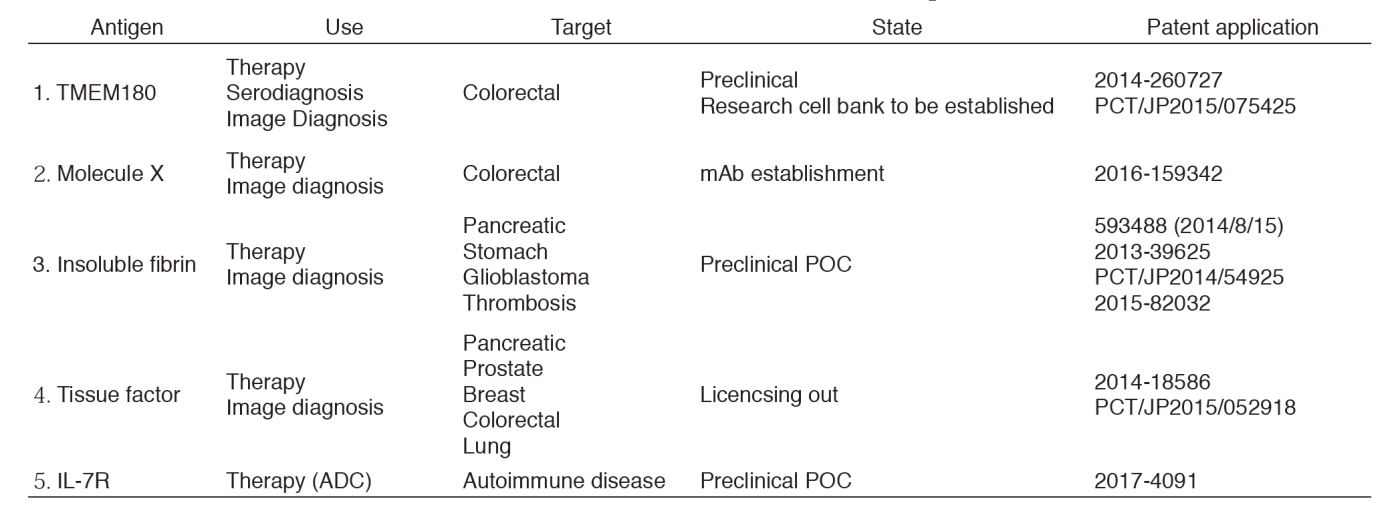HOME > Publication & Reports > Annual Report 2016 > Exploratory Oncology Research & Clinical Trial Center
Division of Developmental Therapeutics
Yasuhiro Matsumura, Masahiro Yasunaga, Yoshikatsu Koga, Shinji Saijo, Shingo Hanaoka, Hisafumi Obonai, Hikaru Iwafuji, Ryo Tsumura, Hiroki Takashima, Hirobumi Fuchigami, Ryo Yoneyama, Takahiro Anzai, Takashi Aiba, Daigo Arita, Madoka Nakayama, Mamiko Shimada, Masahisa Kudo
Introduction
The Division of Developmental Therapeutics has been involved in basic research on drug delivery systems (DDS) and antibody therapeutics including monoclonal antibody (mAb) development, antibody drug conjugate, and mAb conjugated micelle system. We have applied patents of all mAbs established in our division (Table 1). We also investigate a mechanism of cancer induced blood coagulation and are developing a new cancer diagnosis based on the cancer specific mAb. In addition to the research works, we are operating the Japan Clinical Oncology Group (JCOG) Tumor Repository.
Our team and what we do
- Examination of clinical trials as an IRB member
- Operation of the JCOG Tumor Repository
- Management of personal information protection in the National Cancer Center (NCC) Hospital East
Research activities
1.Infrastructure for the mAb development
We have established an infrastructure for antibody development including antigen production, animal immunization, hybridoma production, antibody expansion and purification, SPR characterization, and ELISA development. Simultaneously, we have found various cell surface molecules specific to colorectal cancer and succeeded in developing mAbs the one of those molecules.
2.Cancer Stromal Targeting Therapy
In spite of recent success of antibody drug conjugate (ADC) therapy in patients with hypervascular and special tumors recognized by a particular mAb, there are several issues to be solved for ADC counted as universal therapy for any types of cancer. Especially most human solid tumors possess abundant stroma that hinders the distribution of ADC. To overcome these drawbacks, we developed a unique strategy that the cancer-stromal targeting (CAST) therapy by cytotoxic immunoconjugate bound to the collagen 4, tissue factor (TF), or fibrin network in the tumor stroma from which the payload released gradually and distributed throughout the tumor, resulting in the arrest of tumor growth due to induced damage to tumor cells and tumor vessels. We successfully developed a mAb (102-10 clone) that reacted only with human fibrin, not with human fibrinogen and cross-reacted with mouse fibrin but not with mouse fibrinogen. The specificity of our 102-10 differs from existing anti-fibrin mAbs. Namely, 102-10 reacts only with fibrin clot, but not with fibrinogen, soluble fibrin, or D-dimer. The anti-fibrin antibody therefore did not make immune complex in the bloodstream and circulated in the blood for a long time. We then prepared the antibody drug conjugate (ADC) that is MMAE conjugated anti-fibrin mAb. The ADC may selectively extravasate from leaky tumor vessels, bind to the fibrin network in the stroma and create a scaffold from which effective sustained release of the free MMAE occurs. This free MMAE may easily reach the cancer cells by diffusion through the stroma barrier. Another benefit is that MMAE released from the ADC may also attack the vascular endothelial cells.
3.DDS in Cancer Chemotherapy
Tumor-targeted delivery of therapeutic agents is a longstanding pharmacological goal to improve the treatment selectivity and therapeutic index. Most scientists have sought to use 'active' receptor-mediated tumor-targeting systems. However, the 'passive' targeting afforded by the "Enhanced Permeability and Retention (EPR) effect" provides a versatile and non-saturable approach for tumor-selective delivery. Polymeric micelles are ideally suited to exploit the EPR effect, and have been used for the delivery of a range of anticancer drugs in preclinical and clinical studies.
This year, we reported that anti-TF mAb conjugated micelle incorporating epirubicin exerted a potent antitumor effect in a human pancreatic cancer model, especially TF-high-expressing tumors.
4.Noninvasive Diagnostic Test for Colorectal Cancer
Regarding colorectal cancer (CRC), we investigated the applicability of the fecal miRNA test (FmiRT) to fecal samples used for a previous fecal occult blood test (FOBT) stored under various conditions.
Education
1)Doctoral student
- Graduate School of Frontier Sciences, The University of Tokyo: five students
- Juntendo University Graduate School of Medicine: two students
- Department of Gastroenterology and Hepatology, Institute of Clinical Medicine, Graduate School of Comprehensive Human Sciences, The University of Tsukuba: one student
- Department of Neurosurgery, Kumamoto University Graduate School of Medical Sciences: one student
Table 1. Patent application of monoclonal antibodies developed in our division


2)Master course student
- Graduate School of Frontier Sciences, The University of Tokyo: three students
Future prospects
The project for our team will be a hybrid of biology and physiology as these topics relate to tumors or tumor stroma biology as well as organic chemistry, and has the potential to establish a new field of drug design and to produce many potentially useful treatment modalities, especially for stromal-rich and refractory cancers such as pancreatic cancer, stomach cancer, CRC, and glioma.
List of papers published in 2016
Journal
1.Obonai T, Fuchigami H, Furuya F, Kozuka N, Yasunaga M & Matsumura Y. Tumour imaging by the detection of fibrin clots in tumour stroma using an anti-fibrin Fab fragment. Sci Rep, 6:23613, 2016
2.Sugaya A, Hyodo I, Koga Y, Yamamoto Y, Takashima H, Sato R, Tsumura R, Furuya F, Yasunaga M, Harada M, Tanaka R, Matsumura Y. Utility of epirubicin-incorporating micelles tagged with anti-tissue factor antibody clone with no anticoagulant effect. Cancer Sci, 107:335-340, 2016
3.Fujiwara Y, Furuta M, Manabe S, Koga Y, Yasunaga M, Matsumura Y. Imaging mass spectrometry for the precise design of antibody-drug conjugates. Sci Rep, 6:24954, 2016
4.Kudo M, Yamamoto Y, Koga Y, Hamaguchi T, Akimoto T, Yasunaga M, Matsumura Y. Effect of combined treatment with micelle-incorporated cisplatin (NC-6004) and S-1 on human gastric cancer xenografts. Mol Clin Oncol, 5:817-822, 2016
5.Matsumoto Y, Nichols JW, Toh K, Nomoto T, Cabral H, Miura Y, Christie RJ, Yamada N, Ogura T, Kano MR, Matsumura Y, Nishiyama N, Yamasoba T, Bae YH, Kataoka K. Vascular bursts enhance permeability of tumour blood vessels and improve nanoparticle delivery. Nat Nanotechnol, 11:533-538, 2016
6.Nishiyama N, Matsumura Y, Kataoka K. Development of polymeric micelles for targeting intractable cancers. Cancer Sci, 107:867-874, 2016
